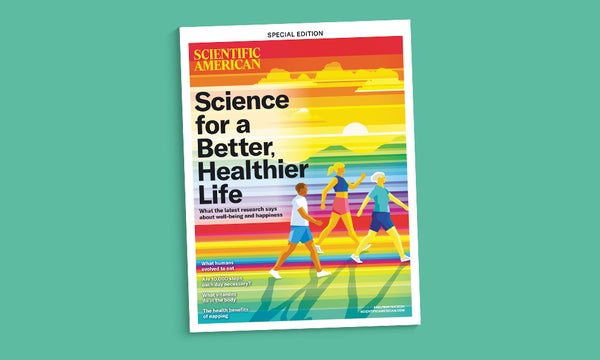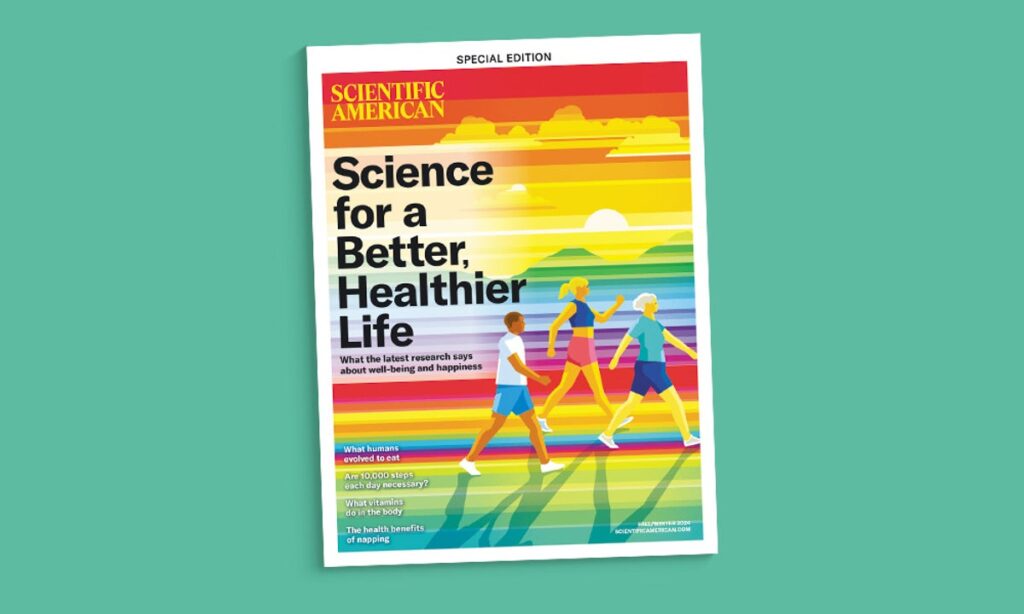[ad_1]
November 27, 2024
3 min read
Science for True Well-Being
The latest research is an antidote to toxic quackery and honest confusion about health

Paul Saladino is an Internet-famous doctor with 2.4 million followers on Instagram. His videos promote so-called animal-based diets—meat, organs, raw dairy, some fruit and zero vegetables. Vegetables, he says, are full of toxins that humans should not consume. In other corners of the platform, hundreds of thousands of people follow influencers who say plant-based diets or juice regimens can cure cancer. Social media is full of health-related misinformation masquerading as fact. So what are health-conscious people to do? Consider this special issue of Scientific American an antidote to toxic quackery and honest confusion about health.
One easy way to improve body and mind: get outside.
The science of health begins with moving the body. There’s no need to fixate on taking 10,000 steps a day (an idea that came from a marketing campaign); studies show that people benefit from different amounts of movement depending on their age. Those who spend more time engaged in moderate to vigorous physical activity have larger brain regions central to memory formation, and adding a cognitive challenge to your workout might stave off brain decline in later years. Weight training helps older adults avoid illness and dangerous falls. Few popular wellness products that claim to prolong your youth are based on evidence, but some basic behavioral changes may give you about 10 more healthy years.
On supporting science journalism
If you’re enjoying this article, consider supporting our award-winning journalism by subscribing. By purchasing a subscription you are helping to ensure the future of impactful stories about the discoveries and ideas shaping our world today.
A common belief is that our metabolism steadily slows as we age. In fact, metabolic efficiency holds constant between ages 20 and 60. What we eat matters. A growing body of research links ultraprocessed foods, whose effects on the brain can mimic those of nicotine and ethanol, to a long list of health problems. Our bodies need sufficient amounts of about 30 vitamins and minerals to function, although doctors have overdiagnosed vitamin D deficiency. The science says that rather than striving for eight glasses of water a day, relying on your body’s thirst cues is adequate to stay hydrated.
We all get sick, but some people are more prone to illness—genetics plays a role, and so do individual inflammatory responses, which is why wearing masks is still important for the immunocompromised. The near future should bring novel, nonaddictive pain medicines and targeted cancer treatments that outperform current chemotherapies. Awareness campaigns around detecting atrial fibrillation and rethinking blood pressure guidelines for women hold life-extending promise.
A healthy mind is essential to true well-being. Regular meditation can reduce stress and improve mental health. Noisy environments increase stress and raise the risk of heart disease, so regular doses of quiet are crucial. New group therapy programs for teenagers who are at risk of depression teach them how to examine their own thoughts, using techniques inspired by cognitive-behavioral therapy, and have been shown to enhance mental health. If you’re feeling stuck, try a quick nap—inventor Thomas Edison relied on them for inspiring new ideas and creativity.
As journalist and Scientific American contributor Lydia Denworth reports, there’s one easy way to improve body and mind: get outside. Nature is a respite from the constant jabbering of social media influencers, yes. But even just two hours a week spent al fresco boosts well-being. Scientists continue to investigate the effect, although it seems intuitive that fresh air and sunshine make the outdoors a healthy place to be.
[ad_2]
Source link

